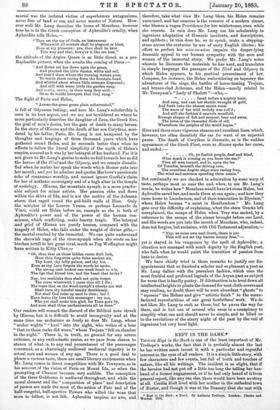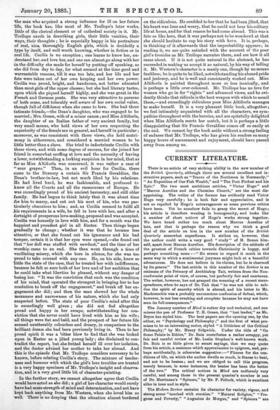KEPT IN THE DARK.*
THOUGH Kept in the Dark is one of the least important of Mr. Trollope's works, the fact that it is probably almost the last be has written must invest it with a particular and regretful interest in the eyes of all readers. It is a simple little story, with few characters and few events, but full of truth and touches of nature, like all his writings. The incident is so slight, that if the heroine had not put off a little too long the telling hei hus- band of a former engagement, or if he had only heard of it from general report, like any one else, there would have been no story at all. Cecilia Holt lived with her mother in the cathedral town of Exeter, and though it was at the Deanery that she met with • Kept in the Dark: a Novel. By Anthony Trollope. London: Chatto and Windus. 1832.
'the man who acquired a strong influence for ill on her future life, the book has, like most of Mr. Trollope's later works, little of the clerical element or of cathedral society in it. Mr. Trollope excels in describing girls, their little vanities, their ways, their thoughts ; he is especially happy in his portraiture of real, nice, thoroughly English girls, which is decidedly a type by itself, and well worth knowing, whether in fiction or in real life. Cecilia is no exception ; one learns to know her, un- derstand her, and love her, and one can almost go along with her in the difficulty she made for herself by putting off speaking, as she did from day to day, for what seemed at the time good and warrantable reasons, till it was too late, and her life and her fate were taken out of her own keeping and her own power. Cecilia was proud, bright, and handsome, not better educated than most girls of the upper classes ; but she had literary tastes, upon which she piqued herself highly, and she was great in the French and German poets. She was very attractive to persons of both sexes, and tolerably well aware of her own social value, though full of diffidence when she came to love. She had three intimate friends,—the Dean's daughter, who was engaged to be married ; Mrs. Green, wife of a minor canon ; and Miss Altifiorla, the daughter of an Italian father of very ancient family, but very small means, who held views of her own respecting the superiority of the female sex in general, and herself in particular ; moreover, as was consistent with these views, she held matri- mony in abhorrence, and considered a married woman to be little better than a slave. She tried to indoctrinate Cecilia with these views, and with some degree of success, for she joined her friend in somewhat scoffing at love and the necessity of having a lover, notwithstanding a lurking suspicion in her mind, that as far as Miss Altifiorla was concerned, it was rather a case of " sour grapes." Then, in an evil hour for Cecilia, there came to the Deanery a certain Sir Francis Geraldine, the Dean's brother-in-law, but not much liked by his relations. He had lived hard, he was fashionable, and professed to know all the Courts and all the racecourses of Europe. He was exceedingly proud of his ancient baronetcy, and still older family. He had begun to think lately that it was about time for him to marry, and cut out his next of kin, who was par- ticularly obnoxious to him ; and, as Cecilia seemed to fulfil all bis requirements in a wife, he fell in love with her, and after a fortnight of prosperous love-making, proposed and was accepted. Cecilia was honestly in love with him, and for a month was the happiest and proudest girl in all Exeter. Then things began gradually to change ; whether it was that he became less attentive, or that she found out his ignorance and his bad temper, certain it is that her eyes were opened,—she found out that " her doll was staffed with sawdust," and the time of her worship came to an end. She then went through a time of vacillating misery, which she bore in silence, for she was too proud to take counsel with any one. He, on his side, knew so little the state of the case, that he treated her with indifference, because he felt so sure both of her love and of her ambition that he could take what liberties he pleased, without any danger of losing her. "It was the conviction that such was the condition of his mind, that operated the strongest in bringing her to her resolution to break off the engagement," and break off her en- gagement she did ; and then the man showed her the whole meanness and narrowness of his nature, which she had only suspected before. The state of poor Cecilia's mind after this is exceedingly well given ; she did not feel altogether proud and happy in her escape, notwithstanding her con- viction that she never could have lived with him as his wife ; all things were fiat and bald, and the prospect of her future life seemed unutterably colourless and dreary, in comparison to the brilliant dream she had been previously living in. Then to her proud spirit it was a bitter blow to find that she was looked upon in Exeter as a jilted young lady ; she disdained to con- tradict the report, but she fretted herself ill over her isolation, and the doctor advised her mother to take her abroad. And this is the episode that Mr. Trollope considers necessary to be known, before relating Cecilia's story. The mixture of tender- ness and humour with which the girl's love troubles are treated is a very happy specimen of Mr. Trollope's insight and observa- tion, and is a very good little bit of character-painting.
In the further story, we cannot altogether agree that Cecilia would have acted as she did ; a girl of her character would surely have had more strength of mind and determination, and not have kept back anything from Mr. Western, when she loved him so well. There is no denying that the situation almost bordered on the ridiculous. He confided to her that he had been jilted, that his heart was lone and weary, that he could not bear his solitary life at home, and for that reason he had come abroad. This was a fate so like hers, that it was perhaps not to be wondered at that she should hesitate to cap his story with hers. It is, perhaps, in thinking of it afterwards that the improbability appears ; in reading it, we are quite satisfied with the account of the poor girl's troubles as Mr. Trollope narrates them, and see how it all came about. If it is not quite natural in the abstract, he has succeeded in making us accept it as natural, by his way of telling it. Mr. Western's character is a manly one, though by no means faultless; he is quite to be liked, notwithstanding his absurd pride and jealousy, and he is well and consistently worked out. Miss Altifiorla is painted throughout more or less ironically, and is perhaps a little over•coloured. Mr. Trollope has no love for women who go in for " rights " and advanced views, and he evi- dently thinks that ridicule is the best weapon with which to assail them,—and exceedingly ridiculous poor Miss Altifiorla manages to make herself. It is a very pleasant little book, altogether ; we feel intimately acquainted with all the characters, we sym- pathise throughout with the heroine, and are spitefully delighted when Miss Altifiorla meets her match, but it is perhaps a little disappointing that Sir Francis Geraldine comes off so easily at the end. We cannot lay the book aside without a strong feeling of sadness that Mr. Trollope, who has given his readers so many happy hours of amusement and enjoyment, should have passed. away from among us.



































 Previous page
Previous page